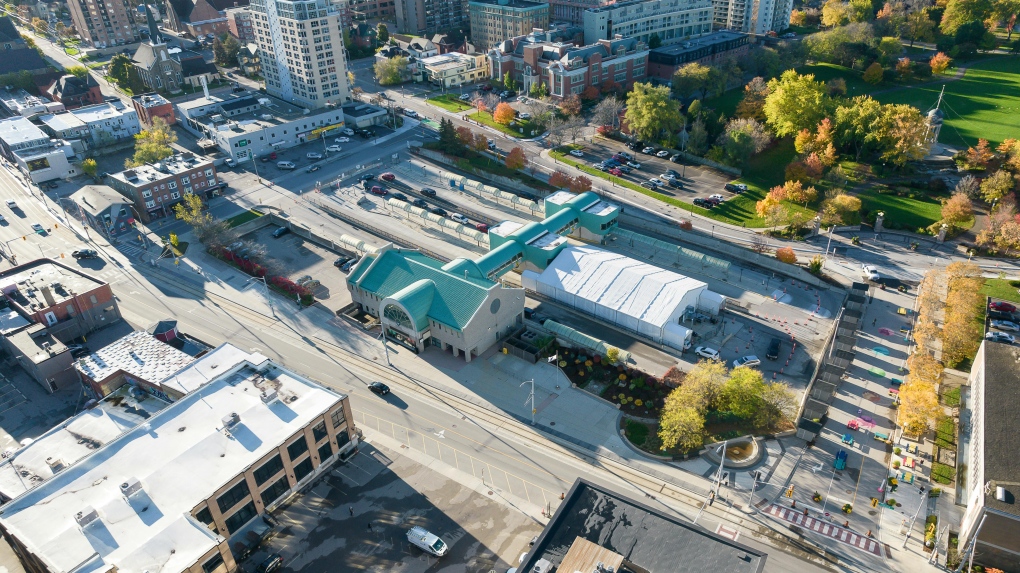Charles Street Terminal redevelopment process inching forward
 Aside from being used as a COVID-19 testing clinic from December 2020 to March 2022, the Charles Street Terminal has been empty since it ceased operations in 2019. (EngageWR.ca)
Aside from being used as a COVID-19 testing clinic from December 2020 to March 2022, the Charles Street Terminal has been empty since it ceased operations in 2019. (EngageWR.ca)
The City of Kitchener’s Finance and Corporate Services Committee has approved a next step in the process that will ultimately determine the future for the Charles Street Terminal.
Operations at the former bus terminal in Kitchener’s downtown core wrapped up in 2019. The site was used as COVID-19 testing clinic from December 2020 to March 2022, but has since been empty.
The terminal, which makes up 88 per cent of the block, is owned by the Region of Waterloo, with the City of Kitchener owning a parking lot that makes up the remaining 12 per cent of the nearly three acre property.
At Monday afternoon’s meeting, the committee approved a Memorandum of Understanding that clarifies how responsibilities and cost sharing will be handled going forward.
Among the arrangements it puts in place, city staff will participate in all applicable processes, but the region will lead and pay for all processes and preliminary work, and the region will be the final decision maker on consultant selections.
The report says preliminary work, including extensive community consultations, environmental work, technical studies, urban design briefs, and a heritage impact assessment, is estimated to cost $840,000. City and regional staff will equally split the cost of community consultation, while the other costs will be split proportional to the percentage of land ownership.
 Public engagement on the future of the former bus terminal began in 2021. (EngageWR.ca)
Public engagement on the future of the former bus terminal began in 2021. (EngageWR.ca)
The Memorandum of Understanding notes it does not constitute approval for a future development, as any decision on that would be subject to council deliberations.
Ahead of the vote, Ward 9 Coun. Debbie Chapman asked there be further clarity provided to address questions being raised about a potential sale of the property, as the MOU lays out a plan for how the city’s expenses will be deducted at the time the land is sold.
Executive Director of Economic Development Cory Bluhm told councillors: “Semantically, the way it was laid out in the report, could be interpreted that the outcome is sale, when really one of the outcomes is sale, the other may not be sale, so this just clarifies the semantic difference in the report.”
Public engagement on the future of the site began in 2021. Co-founders of Land Back Camp Bangishimo and Amy Smoke have been calling for it to be turned into an Indigenous community hub, even creating a short film about their vision.
More details on the project’s progression can be found on EngageWR.
CTVNews.ca Top Stories

TD penalties expected to be higher on alleged drug money laundering link: analyst
A banking analyst says TD Bank Group could be hit with more severe penalties than previously expected after a report that the investigation it faces in the U.S. is tied to laundering illicit fentanyl profits.
Magnitude 4.8 earthquake recorded west of Vancouver Island
A 4.8-magnitude earthquake was reported west of Vancouver Island Thursday evening.
Biscuits with possible plastic pieces, metal found in ground pork: Here are the recalls for this week
Here are the latest recalls Canadians should watch out for, according to Health Canada and the Canadian Food Inspection Agency.
How falling for a stranger she met on a beach led this woman to ditch the U.S. for the French Riviera
Niki Benjamin, from the U.S., had travelled to a paradise island to do some soul searching, and her life ended up going in a very different direction when her dog ran up to a stranger.
Britney Spears 'home and safe' after paramedics responded to an incident at the Chateau Marmont, source tells CNN
A source close to singer Britney Spears tells CNN that the pop star is 'home and safe' after she had a 'major fight' with her boyfriend on Wednesday night at the Chateau Marmont in West Hollywood.
DEVELOPING Foreign interference inquiry to report today on alleged meddling in federal elections
A federal commission of inquiry into foreign interference is slated to release a report today on alleged meddling in the last two general elections.
Princess Anne to take part in B.C. ceremony bringing new ship into Pacific fleet
Western Canada's first Arctic and Offshore Patrol Vessel will officially be brought into the Pacific fleet today and Princess Anne, the sister of King Charles, is scheduled to take part in its commissioning ceremony.
BREAKING Winnipeg man accused of killing four women will be tried by jury
A Winnipeg man accused of killing four Indigenous women will have his case heard by a jury.
Wally, the emotional support alligator once denied entry to a baseball game, is missing
Emotional support animal registrations in the United States reached 115,832 last year, by an industry group’s count. But in the eyes of reptile rescuer Joie Henney, there’s only one: 'Wally Gator.'
































